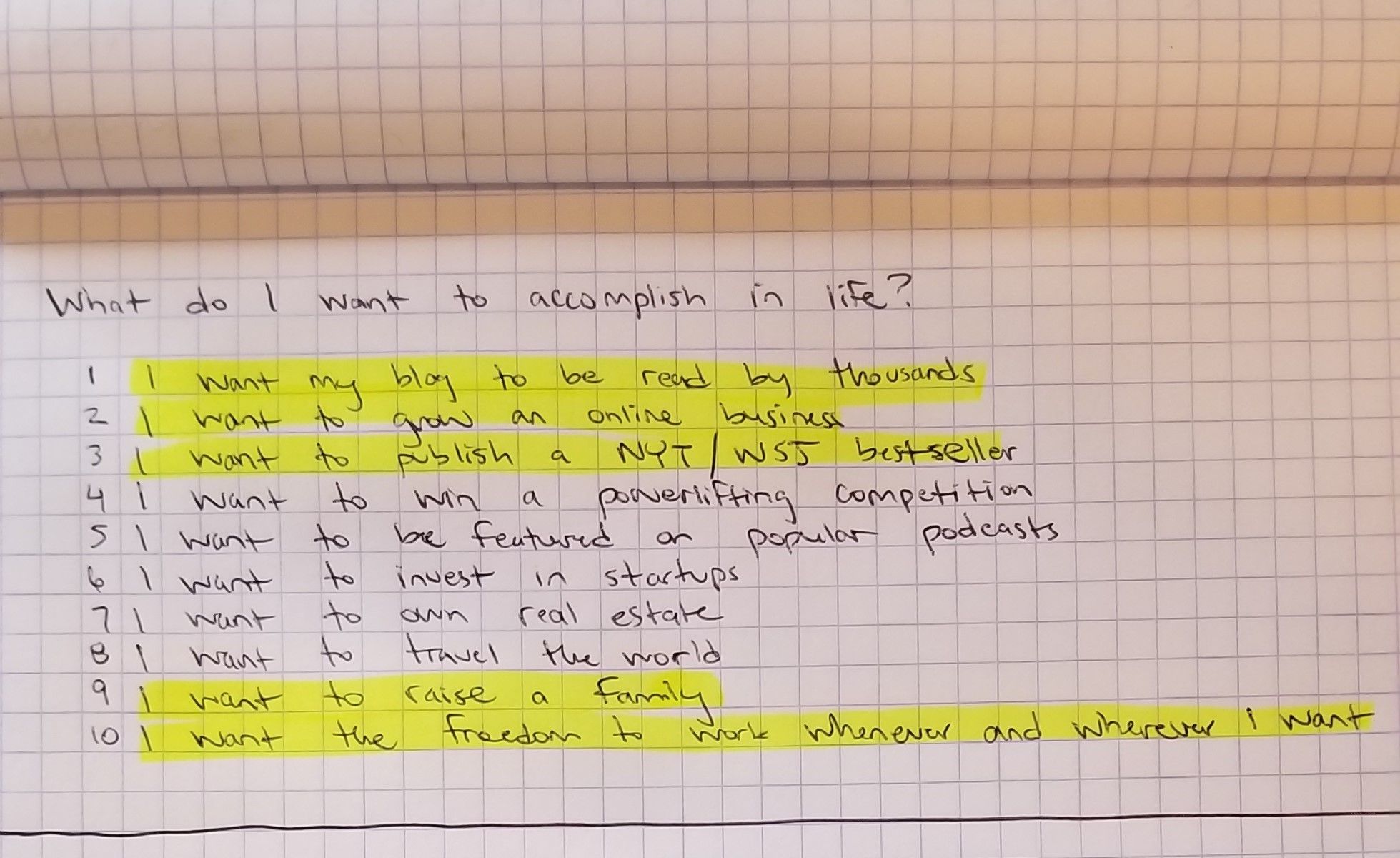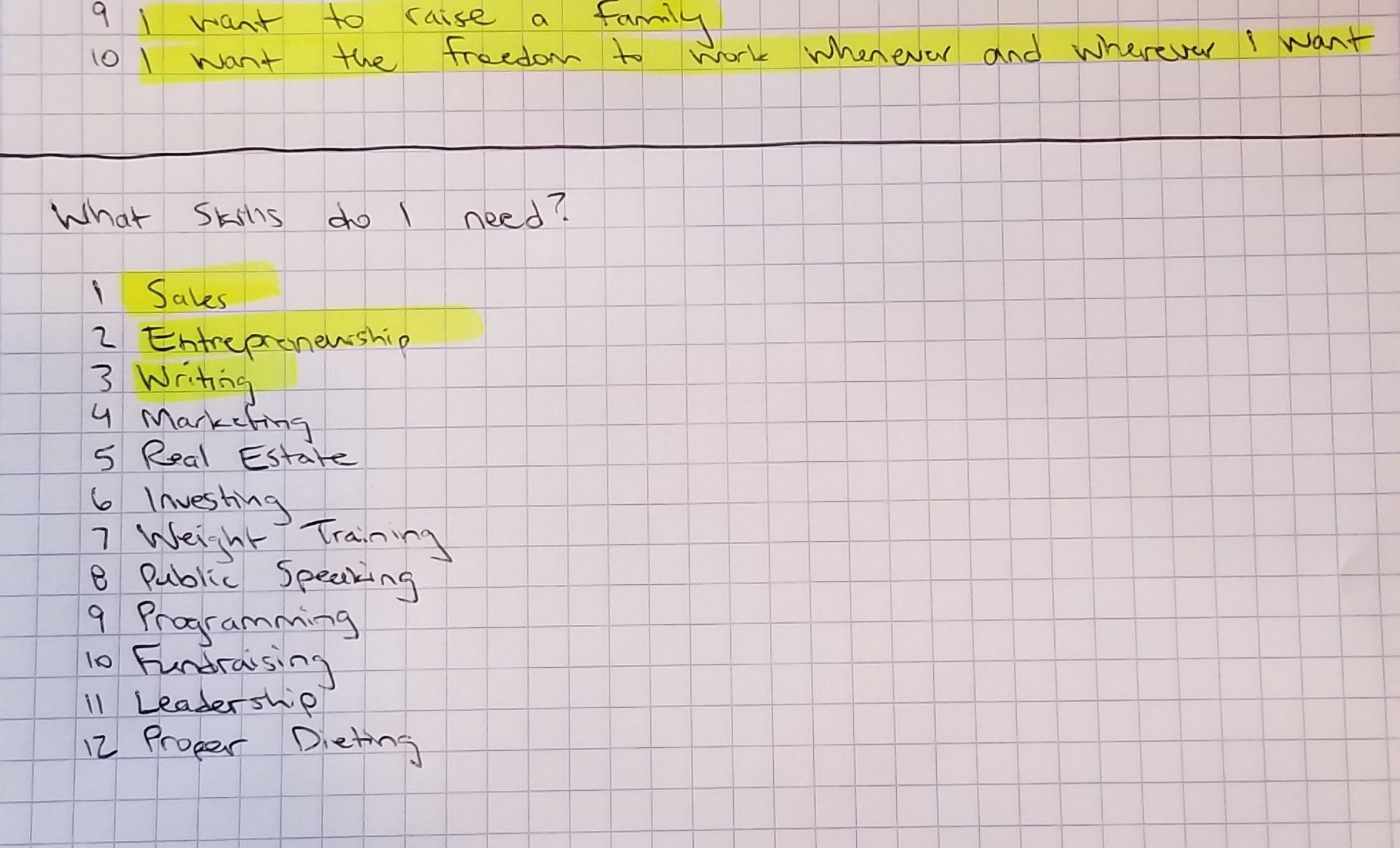“What do you want to be when you grow up?”
Did you ever get asked this growing up as a kid? Maybe you were fortunate enough not to hear it until high school graduation. It often precedes further questions asking if you have already picked out a school and major to pursue. From such a young age, we are increasingly pressured to narrow our focus instead of being able to explore our options.
The education system wants to fast-track us into a career so we can start contributing back with our work and taxes as productive members of society. Even our parents and peers nudge us, sometimes selfishly, to pick careers that will provide financial stability and prestige. What appears to be our own life decisions is more than likely an accumulation of the expectations of others.
These subtle pressures are how you find yourself on a career path that doesn’t match your expectations. Perhaps you hate the type of work you do even if it pays well. Or maybe the career path you chose is slowly dying and being replaced by technology or cheaper labor overseas. Either way, if you feel stuck on your current path but don’t know how to make a change, realize you have full control over your future. Changing the course of your life is as simple as developing skills other people find valuable.
Being able to develop valuable skills in any professional field will allow you to design your career path while providing a comfortable lifestyle. But before you decide on which skill to learn, you must expand your thinking outside of the traditional confines encouraged by your parents and the education system. To do this, you need first to ask yourself a few questions:
Can you be paid reasonably well for this skill? You have to choose something others find valuable and are willing to pay you for it, but this isn’t always obvious though. With the power of the internet, you can now create a lot of value for a passionate audience in small or obscure niches previously left untapped.
Do you enjoy learning this skill? You must enjoy learning it; otherwise, it will be challenging to stick with it long enough to reach a level of competency. Determine what you like working on, whether at work or during your free time and determine if it’s worth pursuing. Coming up with a list of skills you find easy to perform that others consider difficult is a positive sign you are on the right track.
Can you develop the skill on your own? Some skills are too complicated to choose as starting points. If your goal is to practice law or medicine, then you have no option but to follow the traditional route of additional years of schooling and professional training. But for everyone else who already have jobs and need to continue earning a living need a more straightforward approach. You need skills you can develop on your own when you have the time.
If you can answer those three questions honestly, it will lay the groundwork for helping you decide where you should be investing in yourself. Now I’ll show you a simple exercise I’ve used to identify which skills to develop.
How to Pick A Skill to Develop
Take out a sheet of paper or open a word doc and write at the top:
What do I want to accomplish in life?

Use this time to brainstorm those big audacious goals you want for yourself. Maybe you want to write an NYT bestseller or become the CEO of a Fortune 500 company. Anything you would love to do or be a part of should be written down.
Spend about ten minutes coming up with a list of at least ten future accomplishments. If you are having difficulty coming up with some ideas, ask yourself these questions:
- Who is a top performer you admire? What do they do?
- Whose lifestyle do you wish to mimic?
- What did you love doing when you were a kid?
- What problems need solving in the marketplace?
Don’t get caught up with how ridiculous or silly some of your ideas might be, just write them down for now.
Once you have a respectable list of accomplishments written down, look back over your list and determine which ones most excite you. Circle or highlight whichever ones get you the most fired up no matter how difficult they may be to achieve. Try to pick at least five to start.
Now draw a line below your list of accomplishments and write below it:
What skills do I need?

From here, start listing all of the necessary skills you would need to achieve your top five. Some of your accomplishments will require a multitude of skills to accomplish, while others may need one skill.
For example, being a Fortune 500 CEO would require competency in leadership, public speaking, networking, and time management, to name a few. While becoming a professional artist may only require you to be an expert painter. Whatever you want to accomplish, try to do your best identifying every skill you would need. Some skills will be required for more than one of your accomplishments, so be sure to write it down every time it would be necessary. Take no longer than ten minutes to complete.
Once you have filled out your list of skills, it’s time to narrow them down to your top three. Filter them based off of the following criteria:
- Which skills did you write down the most?
- Which skills excite you the most to learn?
- Which skills could you teach yourself?
You should now have your top three skills picked out in as little as 20 minutes. But before we move on, let me remind you that these should be the three skills you get most excited about learning, not the three you think will please your parents and peers the most. From your list, narrow it down to one skill to focus on at this time. We will put the other two skills on hold for the time being.
If you’re still feeling stuck or unsure about what skills to choose, I have a short list you can pick from that would meet our criteria:
Marketing – Focuses on generating interest using targeted ads and analytics to help create brand awareness and eventual sales. A benefit of this skillset is it can allow you to work in almost any industry. You can start learning some of the basics of marketing from popular MOOCs (Massive Open Online Courses) such as Coursera, Skillshare, or Udemy.
Programming – A valuable skillset capable of commanding a high salary right out of the gate. Learning common programming languages such as HTML, CSS, and JavaScript is an excellent place to start. Check out Codecademy for a free online source to help teach you how to code.
Public Speaking – Being able to give presentations in front of a live audience. Public speaking requires competency in delivering a clear message while possessing proper tonality and body language. Joining Toastmasters is a great way to develop this skill in an encouraging environment.
Sales – Helping potential clients solve a problem they may or may not be aware of yet. Being skilled in sales requires clear and effective communication via phone, email, and face to face. This skill set is also valued across many industries and will always be in demand.
Second Language – Being able to speak a second language opens up a realm of possibilities in our ever-increasing globalized economy. Languages in high demand would include Spanish, French, German, Mandarin, Russian, Arabic and Portuguese. Italki is a useful resource for pairing you with a native speaker of the language you are trying to learn to speed up the learning process.
Writing – Being able to express your thoughts clearly in the written word. While writing may not translate into a new career as quickly as the other listed skills, communicating your ideas clearly and concisely is valuable no matter your career path. Becoming a competent writer can help you land jobs in marketing, journalism, and copywriting, etc.
How to Develop Your Skills
“Whatever you can do, or dream you can do, begin it. Boldness has genius, power, and magic in it. Begin it now”
—Johann Wolfgang von Goethe
If you are committed to developing the skills you’ve listed, there is no reason you can’t become competent enough to change your life’s course in as little as six to twelve months. While it may seem like a long time commitment, realize those months are going to pass you by regardless of whether or not you decide to take action. All it takes is a singular focus on the skill you want to develop and a well-thought-out plan. Soaring through the developmental process from novice to competency is a matter of following these guidelines:
Novice Stage – This is where everybody starts when they try something new. Operating in a new domain requires clear, context-free rules to follow, also known as recipes. One of the most critical steps in the novice stage is learning how to filter information to determine which recipes are worth copying. Advancing quickly as a novice requires keen observation to determine who the top performers are in your field of study and picking up their rules and strategies to use as your own.
Now the real work begins for acquiring the skill. Skill development requires deliberate practice or putting in many hours of demanding work consistently while receiving feedback on your progress. That’s why it’s so important to focus on learning one skill at this time. It will also build your power of concentration, which is a necessary skill in of itself to help you achieve your goal. These beginning stages are where you build up focus by utilizing deep work sessions to advance through the ranks.
Skill development is committing yourself to the long game. In other words, you must be willing to commit to what Malcolm Gladwell calls the “10,000-Hour Rule”. The journey will be tedious and difficult at times, but the payoff is worth it. To help fight through the inevitable difficult moments, it helps to adhere to the following strategies:
- Find an accountability partner you can meet with on a routine basis to ensure you stay on track.
- Ask for consistent feedback from those who are more advanced than you in the skill you are learning. You will develop at a quicker rate, which will encourage you to keep improving.
- Apply what you are learning to a project you find enjoyable. For example, if you are learning how to write, then create a blog. If you are learning how to code, create a Github account.
Advanced Beginner Stage – As you gain more skill and understanding, you will move into the next stage of your journey – the advanced beginner. You are now able to break away from the fixed rules used to guide you as a novice and start thinking about problems from a new perspective. You can also begin experimenting by creating works of your own from your new skill set.
Now it’s time for you to start pushing your boundaries by coming up with original works on your own. Consider sharing some of your work before the public eye to receive critical feedback from an unfamiliar audience; this will push you to create your best work. Unfortunately, many people stop their development journey at this stage, never allowing themselves to reach competency.
Competent Stage – What separates the competent performer from the advanced beginner is the ability to troubleshoot their problems. You are capable of relying on experience and current ability to work through challenges instead of having to seek help when problems arise. You now see the “big picture” through the mental models you have developed and put into practice. You are also skilled enough to start tackling challenges you haven’t witnessed before on your own.
Once you reach this stage, you can effectively market yourself in the workforce. Your ability to teach yourself also gives you the option to pursue unconventional career paths such as working for yourself. Knowing how to develop valuable skills will provide you with the ultimate freedom to design your career path instead of letting someone else decide it for you.
Should You Specialize Or Be A Generalist?
Once you have reached competency in your skill development journey, you have a choice to make. Should you continue to hone the skill for years to come to attain mastery, or should you begin developing the other skills on your list to become more of a generalist?
So what is the correct answer?
Well, it depends on what you wish to do with your life. Do you seek the role of the specialist who is at the top of their field, or do you want to be the jack of all trades who can leverage their skill set to provide value in a variety of markets? Let’s consider both options.
Becoming a top specialist in your field of study can command a very high salary to match your rank (consider how much the top surgeons, programmers, or MLB pitchers earn in a given year). But the potential downside is having all of your eggs in one basket. What if you injure yourself in such a way that you can no longer perform at an elite level or advancements in technology can outperform you for a fraction of the cost?
So should you instead focus on becoming a generalist with many useful skills? Although you may not be able to command as high of a salary as a specialist, you are not left as vulnerable if the conditions around your career path change. Generalists typically make great managers since they often possess many of the skills necessary for leading groups of people towards a common goal in an organization.
While either option may sound appealing to you, I propose a third option: the “generalized specialist.”
Popularized by Shane Parrish from Farnam Street, he defines the generalized specialist as:
“A generalizing specialist has a core competency which they know a lot about. At the same time, they are always learning and have a working knowledge of other areas. While a generalist has roughly the same knowledge of multiple areas, a generalizing specialist has one deep area of expertise and a few shallow ones. We have the option of developing a core competency while building a base of interdisciplinary knowledge.”
In other words, you develop one core skill to a deep level of understanding, then focus on building out a diverse set of secondary skills to compliment your specialization. You are effectively creating your competitive advantage by combing a unique set of skills not easily replicated in the market.
For example, consider how valuable a doctor who is also a skilled writer and public speaker can be for his audience. Or consider a programmer who is also proficient in both design and marketing. When you can build a general skill set around a primary skill, you open your career up to countless possibilities.
Start Today
I have given you the framework for building the future you want. Now all you have to do is spend a minimum of 20 minutes going through the exercise yourself. Pick one skill to be your sole focus for the next couple of months. If you discover after a month of learning that you don’t like the skill you chose, drop it and start learning the next one on your list. There is no shame in quitting what you don’t enjoy and trying again.
Remember, these next couple of months to a year are going to pass you by regardless of whether or not you decide to take action. You might as well use these next 20 minutes to be the start of a new journey.

